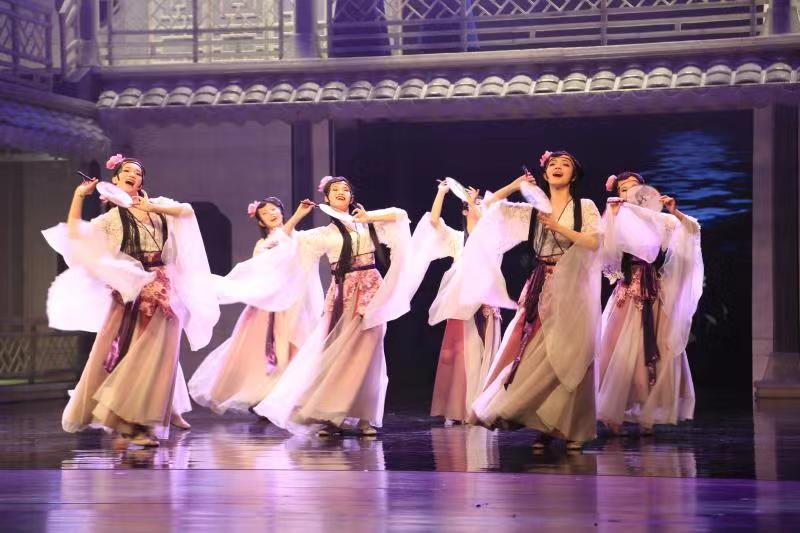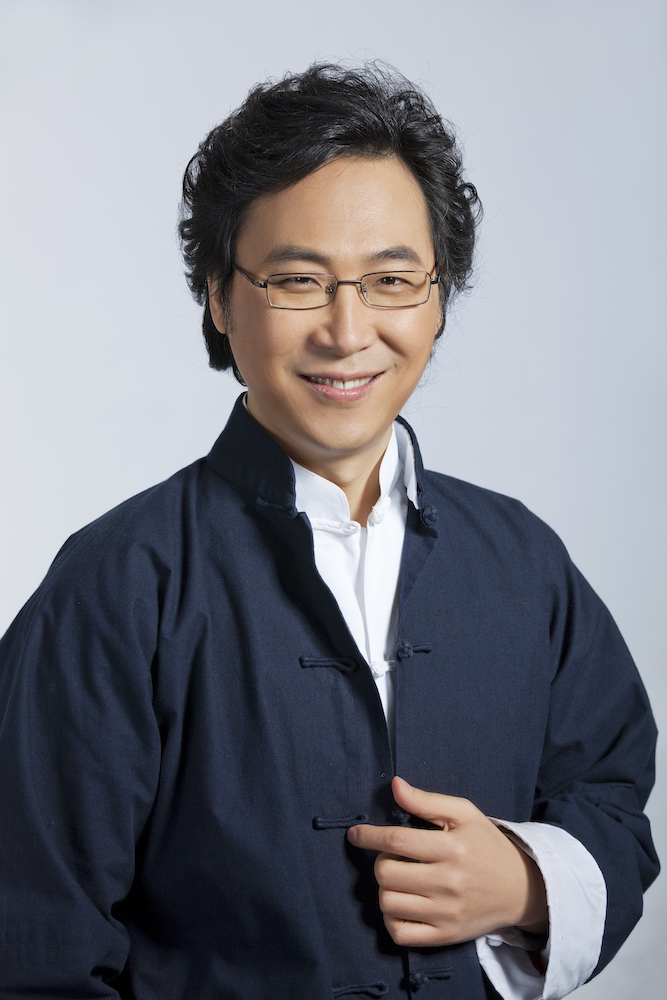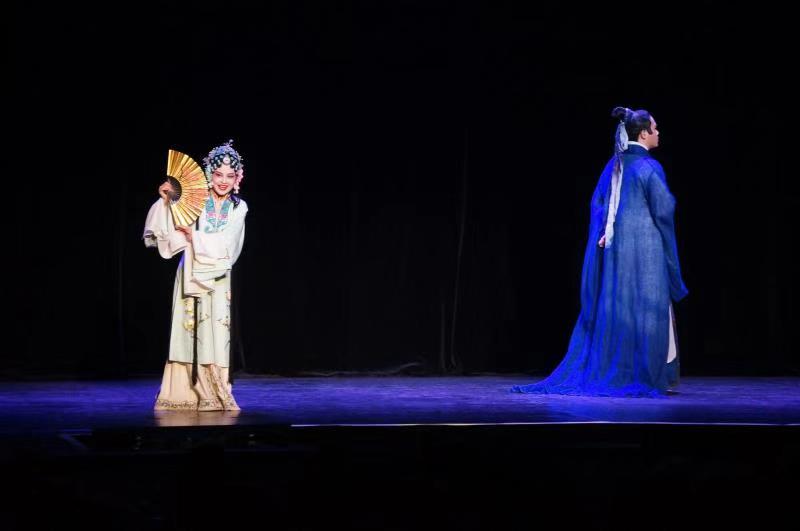Playwright Tang Xianzu was an almost exact contemporary of William Shakespeare, and indeed, the two playwrights died in the same year 1616, yet he doesn’t receive nearly the same attention in the West as his English counterpart. That is set to change with the Australian premiere of the Shanghai Conservatory of Music’s Tang Xianzu the Playwright in Concert, set to play in Melbourne and Sydney in April.
 Tang the Playwright: A Life in Dreams. Photo: supplied
Tang the Playwright: A Life in Dreams. Photo: supplied
For the Conservatory’s President, award-winning Chinese baritone Changyong Liao, the opera – which he will direct – is part of the institution’s goal to translate ancient Chinese culture for contemporary audiences, “to relate good Chinese stories,” and “to let other countries hear Chinese voices and share our heritage with the world.”
For Liao, Tang the Playwright: A Life in Dreams – which marks the Shanghai Conservatory Symphony and Opera’s Australian debut – sheds new light on the life of Tang Xianzu. “By presenting selected events that best illustrate Tang’s personality and virtues, it discloses the reason for his greatness as a litterateur and a playwright and explains why the love displayed in Tang’s masterpieces has shown the spiritual strength of eternity shared by all mankind,” he says. “With the integration of Chinese traditional musical instruments and traditional opera elements, it displays a strong Chinese national flavour. The play touches most upon the love and the spiritual world of the nobility, as demonstrated through the protagonist Tang. Building on the theatrical heritage of the Kun Opera Mu Dan Ting (The Peony Pavilion), this opera adds more colour to the image of Tang Xianzu by portraying a cultural giant who is also a national pride of China.”
 Liao Changyong. Photo: supplied
Liao Changyong. Photo: supplied
Tang Xianzu was born in 1550 and died in 1616, during the Ming Dynasty in China, the 276-year period from 1368 to 1644. “At that time, the literary circles mainly focus on poetry and prose instead of drama,” Liao says. “Therefore, very few people pursue as earnestly in writing drama as in poetry and prose. Tang is an exception though. He’s famous not only in poetry and prose, but also displays creativeness in dramatic writing and always flies his own colours. Moreover, as we can see in this play, Tang says that, “For nobility, the real cause is to serve the people and the country; Poetry and theatre are nothing but a pastime”, which shows that he holds lofty ideals and grand aspirations too. He’s a noble and upright man in conduct and governance in addition to the fact that he’s a great litterateur and playwright.”
The playwright has been dubbed the ‘Shakespeare of the East’, but how appropriate is this moniker? “They live almost in the same age,” says Liao. “And in 2016 when we first created the musical version of Tang Xianzu, we wanted to commemorate the 400th anniversary of the passing of the two literary giants. In their works, we find a great deal of information about the societies that they lived in, the views and values of people at that time, the culture and tradition, aesthetics, etc. They are both peaks in the literary world in their countries and weigh a lot in the world theatrical arena. A parallel wonder in the world history of theatre, we may say.”
The opera focuses on Tang’s four most important works – if he’s the Shakespeare of the East, these are his Big Four. “Tang’s renowned Four Dreams in Linchuan are Mu Dan Ting (The Peony Pavilion), Zi Chai Ji (The Purple Hairpin), Han Dan Ji (The Handan Dream) and Nan Ke Ji (A Dream under the Southern Bough) respectively,” Liao says. “The four works amaze numerous people with their artistic forms, exquisite storylines and realistic significance. The first two works are romantic stories, relating what we understand as the supreme love and moral integrity; the other two are more realistic works, giving a panorama of society and the ups and downs of people’s lives in it. From my eyes, maybe it’s due to the relevance to dreams in all four works that we name them the Four Dreams in Linchuan. From a certain point of view, Tang’s life as a playwright also reflects his own dreams coming true.”

The Four Dreams have been adapted for the different audiences across the 400 years since they were written. “Modern interpretations of the Four Dreams not only inherit the essence of ancient arts, but combine modern performing skills and techniques,” Liao says. “They have won recognition and acclaim from the audiences in China, who’ve shown great respect and love for the artistic classics.”
According to Liao, love, dreams and theatre thread through Tang’s life, and love is the major driving force of the Four Dreams. “Dreams are the representation of his pursuit for true love and uprightness, or to say the artistic form of the two,” Liao says. “Theatre is about dreams, in an attempt to specify and bring to the stage what he loves and dreams of. Dream under the Southern Bough and The Handan Dream describe the journey of life being an official that is either real or imaginary, The Purple Hairpin depicts his understanding of how love and honesty overwhelm the fortune. The Peony Pavilion is the most thought-provoking: people in love will transcend the boundary of life and death, and in the end, lovers will revive to gain a happy ending.”
In Australia, the playwright himself will be played by Hu Sihao. “His loud and sonorous singing will best interpret Tang’s characters – sincere, upright and noble,” Liao says. Tang’s wife, Madam Wu, will be sung by Chen Jingwei. “In this play, Madam Wu embodies Tang’s unswerving commitment to ideals and love, and this story casts a new light on the ups and downs of Tang’s life.”
Like Shakespeare’s works in the West, Tang’s plays are considered classics in China. “It’s due to the charisma of literature, also the beauty of Kun Opera,” Liao says. “The Kun Opera can be divided into two schools: the Southern and the Northern. In both schools, performers will combine their gestures, footsteps, expression in eyes, use of fans together to deliver a full meaning. When the Four Dreams are adapted to modern Kun Opera, there are no longer strict standardised requirements for performance. Details can be adjusted, performers’ understanding of the roles can be integrated, presentation of emotions are more outward and natural, all in an attempt to help audiences better understand the characters and the story.”
In that spirit, Shanghai Conservatory Opera’s Tang the Playwright: A Life in Dreams will combine musical elements from Nuo and Yihuang theatrical music, to elements of symphonic music, traditional operas, jazz, pop, Huai-yang local theatre and more. “In this way, the storyline is highlighted, the rhythm of narration is clear and well-controlled, and we are able to present the unique Chinese opera style that is equally traditional and modern,” Liao says.
Book now to get inside the psyche of one of China’s most celebrated theatrical minds. Limelight readers save 30% when booking through the links below.
Tang Xianzu the Playwright in Concert plays at Melbourne Recital Centre on April 5
Tang Xianzu the Playwright in Concert plays at the Sydney Opera House on April 7











Comments
Log in to join the conversation.